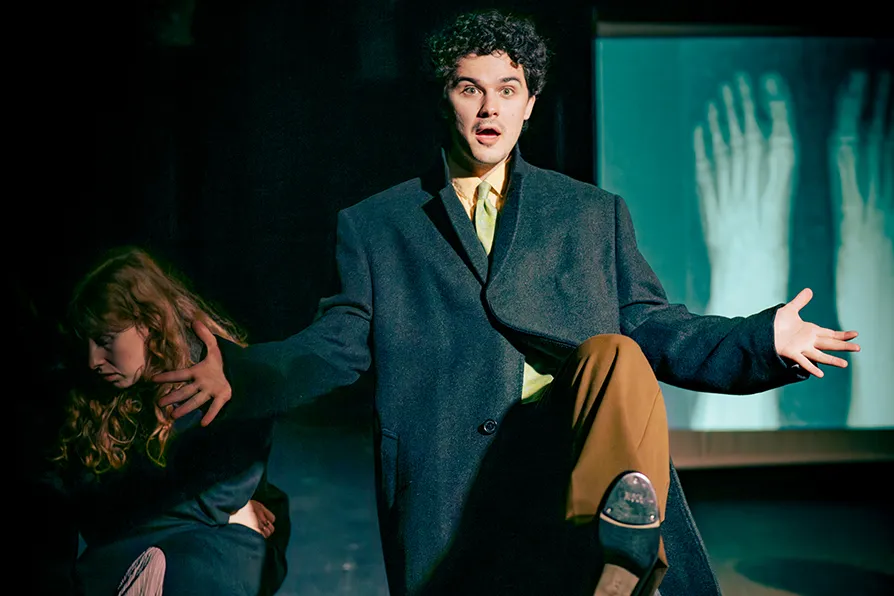RITA DI SANTO draws attention to a new film that features Ken Loach and Jeremy Corbyn, and their personal experience of media misrepresentation
Error message
An error occurred while searching, try again later.MARY CONWAY is disappointed by an incoherent show that fails to question stereotypical assumptions about the Soviet Union

 LAZY PROPAGANDA: Max Taptygin in Boogie On The Bones [Pic: Courtesy of Omnibus Theatre]
LAZY PROPAGANDA: Max Taptygin in Boogie On The Bones [Pic: Courtesy of Omnibus Theatre]
Boogie on the Bones
Omnibus Theatre
⭑⭑☆☆☆
OMNIBUS THEATRE is a vigorous local venue in Clapham with a faithful following and a fine history. Quite why they have allocated two weeks to this muddle of a show is not clear. Indeed, it feels like the sort of entertainment that would be thrown together by a few school leavers.
Maybe it is in this spirit that the play should be reviewed.
On the plus side, the ensemble cast of six display a range of musical and acting skills that are, on the face of it, seductive. They are young, energetic and easy on the eye. Individually, they could hold their own in a genuinely professional show and there is evidence of a serious approach to their material.
But as for the play: the concept, the storyline, the period detail, the intellectual thread are confused and confusing.
The company, we are informed, is a Slavic group, although this information does not appear to feature in any publicity. The evident aim of the play is to reveal how immersion in music can be a potent form of resistance to state oppression and conformity. The music here is loosely described by the company as “jazz”.
The action is said to take place in 1956, in Moscow, and bases its thesis on a series of assumptions that are never unpicked for the audience: firstly, that Moscow in 1956 is not only a grey, joyless place but also a Big Brother domain worthy of George Orwell; and secondly, that all hope emerges from the US where the music and supposed post-war youth rebellion bring hope and spiritual regeneration. This stereotypical stance is taken as read.
So, we rely on the music to carry the show. Indeed, there are moments when both it and the dancing light us up. But even this is intermittent. This is an uneasy combination of both recorded and live music, and — though occasionally including jazz — a curious collection of tunes, old and new, but certainly not confined to period. Elvis Presley’s Fever, for instance, was not recorded until 1960. And are we to assume there was no music in Russia hitherto?
Andrii Zamiatin as Mels displays a range of musical talents and Anastasia Aush (Polly) treats us to a fetching dance. The huge moulded heads of Marx, Engels, Lenin and Stalin (from which Mels incidentally gets his name) are superb, but underused and never explained. And, in the end, this could be any group of young people anywhere just being young, and even the much-mentioned rebellious colourful clothing is muted and awkward.
There is a story of sorts but fragmented, and seemingly much better understood by the cast than by the audience. And the play is so derivative — confirming an already well-versed, Western attitude towards Russia — that you wonder why it’s repeated here with no new information. A pity.
A pity, too, that this potential period-music fest is so restrained and that a few young people briefly shedding the grey office suit are deemed to constitute rebellion.
All respect for the cast but the show disappoints.
Runs until October 25. Box Office: 0207 498 4699, omnibus-clapham.org










